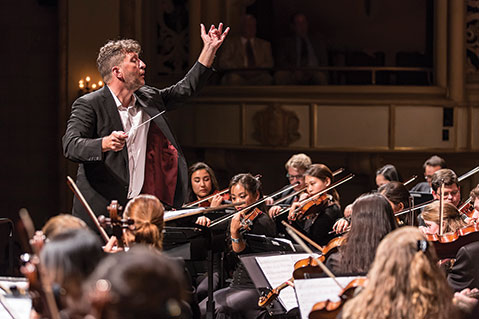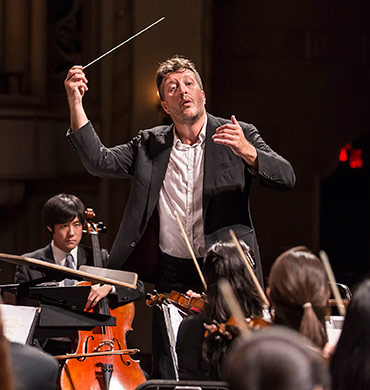Review: Academy Festival Orchestra at the Granada Theatre
Thomas Adès Conducted Ives, Britten, and Stravinsky on August 9

The final concert of the 2014 Music Academy of the West season brought one of the world’s most distinguished composers not only to the hall but also to the podium, as Thomas Adès conducted his own composition, Polaris, alongside a trio of works by 20th-century masters Charles Ives, Benjamin Britten, and Igor Stravinsky. Adès is no stranger to Santa Barbara or Stravinsky. In 2008, he and violinist Anthony Marwood appeared at the Lobero Theatre as part of CAMA’s Masterseries in an evening that recreated in its entirety a program played by Stravinsky himself (and violinist Samuel Dushkin) back in March 1937 — also at the Lobero and also presented by CAMA. On the present occasion, forgoing the piano for the role of conductor, Adès brought a similar blend of imagination and scholarly rigor to an orchestral program that centered on Petrushka, Stravinsky’s classic ballet of 1910-11.
The program for this concert reflected the great musical distance traveled by this edition of the Academy Festival Orchestra over the course of the 2014 season. From the gorgeous Alpine sonorities of Richard Strauss to the pungent Americana bitonality of Charles Ives, and from the relatively chaste neoclassicism of Sergei Prokofiev to the highly colored orchestration of Stravinsky, these concerts, separated by only seven weeks, present a decided contrast. Yet there’s also plenty in common; the magnificent brass section we heard in June echoed again in August, this time with the strains of the familiar patriotic tune “America, the Beautiful,” as alchemized in 1891 by a Connecticut teenager named Charles Ives. Think multiple keys, castanets, and trombones.

Following the relatively short work by Ives, Britten’s Four Sea Interludes from Peter Grimes Op. 33a (1945) introduced an oceanic feeling that would be taken up again later in both the Adès and, to a lesser extent, the Stravinsky works, while still retaining a connection to the small-town worldview of Ives’s fantasy of band music. The Britten piece soared without ever slipping into sentimentality or cliché. Polaris, which premiered in 2010, was a revelation. Using canon form to repeat a single, quite simple musical phrase in a dazzling panoply of incarnations, the piece built steadily from an almost minimalist percussive opening to a series of three monumental, brass-assisted climaxes. The tuba player was the sole member of the brass section who remained onstage, as the trumpets and trombones fanned out to positions in the upper and lower boxes that flank the Granada stage.
Composed amid the creative ferment that became The Rite of Spring, Petrushka finds Stravinsky in the grip of another of his intense visions of contemporary life pictured in terms of Russian folklore. The story of how the puppet Petrushka becomes human, discovers love with a ballerina, suffers from jealousy, and then dies on the sword of his rival gave the composer multiple points of departure for some of his most adventurous music. Petrushka contains a great deal of extremely expressive writing for the piano, the instrument representing the irrepressible spirit of the title character, which the composer imagined “exasperating the patience of the orchestra with diabolical cascades of arpeggios.” The orchestra answers back with great volleys from the trumpets, with the section led in this performance by principal musician Anthony Bellino. Petrushka made a brilliant finale to what has been a historic season for the Music Academy of the West, one in which modern music has truly come into its own.



